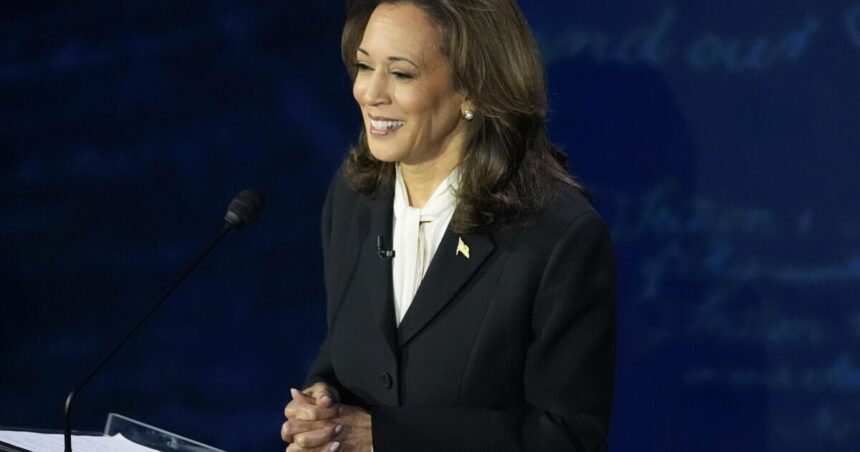The 1980 presidential election remained close in the final weeks, with a significant segment of the electorate weighing their disappointment with President Carter against their fears about his rival, Ronald Reagan.
The two men faced off in their only televised debate a week before Election Day, and viewers found Reagan to be friendly, reassuring and fit to be president. Polls showed Reagan’s popularity soaring over the final weekend, and he won handily.
Since then, candidates in close races have hoped to emulate Reagan’s approach.
There is no one here.
Vice President Kamala Harris probably wouldn’t have gotten that far in this week’s debate: Among other factors, the electorate she faces is far more partisan than the 1980 electorate, making it much harder to move the needle.
But Harris made great strides in two key areas: reminding voters what they don’t like about Trump and coming across as presidential.
How much support Harris has gained will not be known for several more days, pending the results of high-quality post-debate polls.
But rapid polls have already shown a big shift toward Democrats.
Taking all the latest polls into account, a 2-3 point increase in support for Harris would give her a slight edge as the race enters its final stages, and a larger increase in the polls would be a major win.
In contrast, if polls don’t show a movement in Harris’ favor after the debate, when a majority of viewers predicted she would win, it could signal more stubborn resistance to her campaign among swing voters that may be difficult to overcome.
Strengthening Trump’s negative aspects
A key indicator to watch will be the percentage of voters who have an unfavorable opinion of Trump.
The former president, as he has throughout his political career, continues to be viewed negatively by the public, which puts him at a disadvantage against Harris, who is roughly evenly split among voters in favorable and unfavorable views.
But Trump’s approval ratings have improved this year, and the percentage who view him unfavorably is at the lowest point of his presidency.
Analysts cite several explanations. The rose-tinted glow of nostalgia makes almost every president more popular after he leaves office. Its effect may have been especially pronounced this time, as skyrocketing inflation in 2021 and 2022 caused voters to fondly recall the booming first three years of Trump’s presidency. And younger voters may have only vague memories of the Trump controversies that occurred when they were teenagers.
Whatever the reason, the percentage of Americans who have a favorable view of Trump is at an all-time high, at 43%, according to an average of polls compiled by the FiveThirtyEight website, while the unfavorable share is at a correspondingly low, at 53%.
During Biden’s presidential campaign, his campaign spent tens of millions of dollars trying to further damage Trump’s image but failed, and overcoming nostalgia for Trump remains a key challenge for Democrats.
During the debate, Harris spent a great deal of time reminding voters about Trump’s personal negative aspects – his felony convictions, his role in the Jan. 6, 2021, attack on the Capitol, and the numerous former Trump administration officials who have refused to endorse him again – as well as the unpopular policies he has supported, including the overturning of Roe v. Wade.
The effort is primarily targeting voters in the middle, those whose feelings toward Trump are neither very negative nor very positive.
About a quarter of voters fall into this group, according to a New York Times/Siena College poll released this week, which found that 29% have a very favorable view of Trump, while 44% have a very unfavorable view. The middle 25% are split between 17% who have a somewhat favorable view of Trump and 8% who have a somewhat unfavorable view of him.
Another question in the poll – asking whether Trump has ever said anything to you that made you feel uncomfortable – sheds further light on which voters Harris may have been targeting.
The most common response, 43%, was that Trump had “recently” scolded them – Ms Harris already has the support of a majority of them.
An additional 29% said Trump has never said anything offensive, making up Trump’s most loyal base of supporters.
The middle group, 27%, said Trump has berated them before, but “not recently.” This group is potentially open to persuasion, which is why Harris was so effective in encouraging Trump to make outlandish accusations, such as Trump’s claim that immigrants in a small Ohio city “eat dogs. They’re the ones who come in. They eat cats. They eat the pets of the people who live there.”
Ohio authorities and multiple media outlets found no evidence to support Trump’s claims, but there have since been reports of immigrants in the region being harassed and threatened as a result of the false allegations.
It remains to be seen how many voters were put off by these remarks, but it is clear that the more voters shift from a “not so recently” view to one that now finds Trump unpleasant, the more likely Harris will have an advantage.
“Loss aversion”
Michael Podhorzer, a former AFL-CIO political director and current political analyst, frequently says that while there is a majority of anti-MAGA voters in America, that doesn’t necessarily mean there is a majority of Democrat voters.
His argument is that the voters Democrats need to win a majority are “driven by loss aversion” — they fear that Trump and his allies will take away the rights and benefits they currently rely on, but they won’t necessarily vote in support of new Democratic priorities like more partisan voters would.
Podhorzer argues that politically disengaged voters, mostly young people, will turn out to vote if they are reminded of what it means to vote and see realistic scenarios in which their vote can make a difference.
The 2020 midterm elections followed exactly that pattern: In states like Michigan and Pennsylvania, where abortion rights were hotly contested and it was unclear which side would win, voters cast their ballots for the Democratic candidates.
They were unlikely to show up in states where the stakes seemed low, such as New York or California, or in Texas, where abortion rights gains are unlikely.
Harris capitalized on voters’ loss-aversion sentiment during the debate, focusing on Trump’s repeated attempts to repeal Obamacare and his role in ending Roe v. Wade, the ruling that guaranteed abortion rights nationwide.
As he did elsewhere in the debate, Trump played into Harris’ hands: On health care, he suggested he might be open to a separate effort to repeal the ACA, but said he still only had a “visionary plan” after nine years of promising an alternative.
On the issue of abortion, Trump has continued to try to obfuscate his position: Like many Republicans, he fears alienating staunch anti-abortion wing members of his party, but he also knows that banning abortion is deeply unpopular.
During the debate, he insisted he did not support a nationwide ban, but explicitly refused to say he would veto it if Republicans in Congress passed one.
“There’s no need to discuss that,” he said twice.
The phrase, and the “plan concept,” are expected to feature in Democratic ads in the final weeks of the campaign.
The news cycle
Democrats are celebrating Harris’ performance, but there’s a good reason why a fall debate hasn’t permanently reoriented the campaign since 1980: News cycles keep moving, other things happen and memories fade.
Big events are already looming, including a possible government shutdown at the end of the month.
Members of the right-wing House Freedom Caucus said they would not vote for a bill to fund government agencies in the new fiscal year unless it included measures they have pushed to block non-citizens from voting.
Federal law already bars foreigners from voting, so Democrats suspect the Freedom Caucus has an ulterior motive, and their election lawyers say provisions in the Republican bill could be a pretext to undermine this year’s election.
Trump has egged on the Freedom Caucus, writing on his website Truth Social that they should refuse to vote for the government’s finance bill “in any form” unless they get “absolute guarantees”.
On Wednesday, House Speaker Mike Johnson (R-Louisiana) was forced to withdraw the bill from the floor after lacking the votes needed to pass it.
A government shutdown is always unpopular, and one just weeks before an election could deal a severe blow to Republicans in battleground states.
So Johnson and other Republican leaders will likely try hard to find a compromise with Democrats to extend the deadline until later this year.
But President Trump’s role in supporting the shutdown would complicate any deal, and as in any game of chicken, the possibility of conflict cannot be ruled out.
It’s unclear how a government shutdown will affect the presidential election, but its possibility is a reminder that this week’s debate may be a distant memory by the time most voters cast their ballots.
What else to read
This week’s poll:
On Saturday it was written:
LA Times Feature:
—
Was this newsletter forwarded to you? Add it to your inbox.









